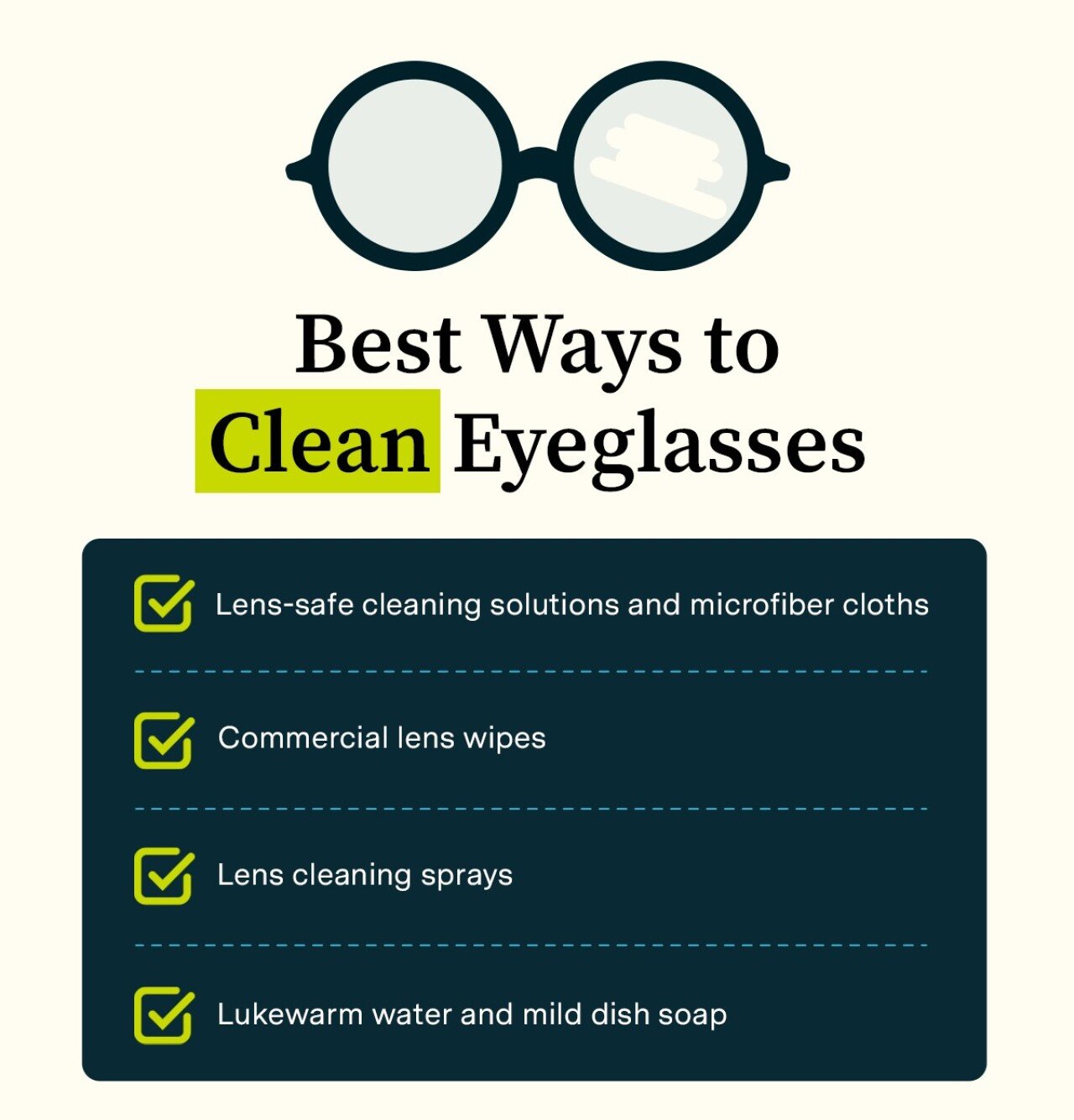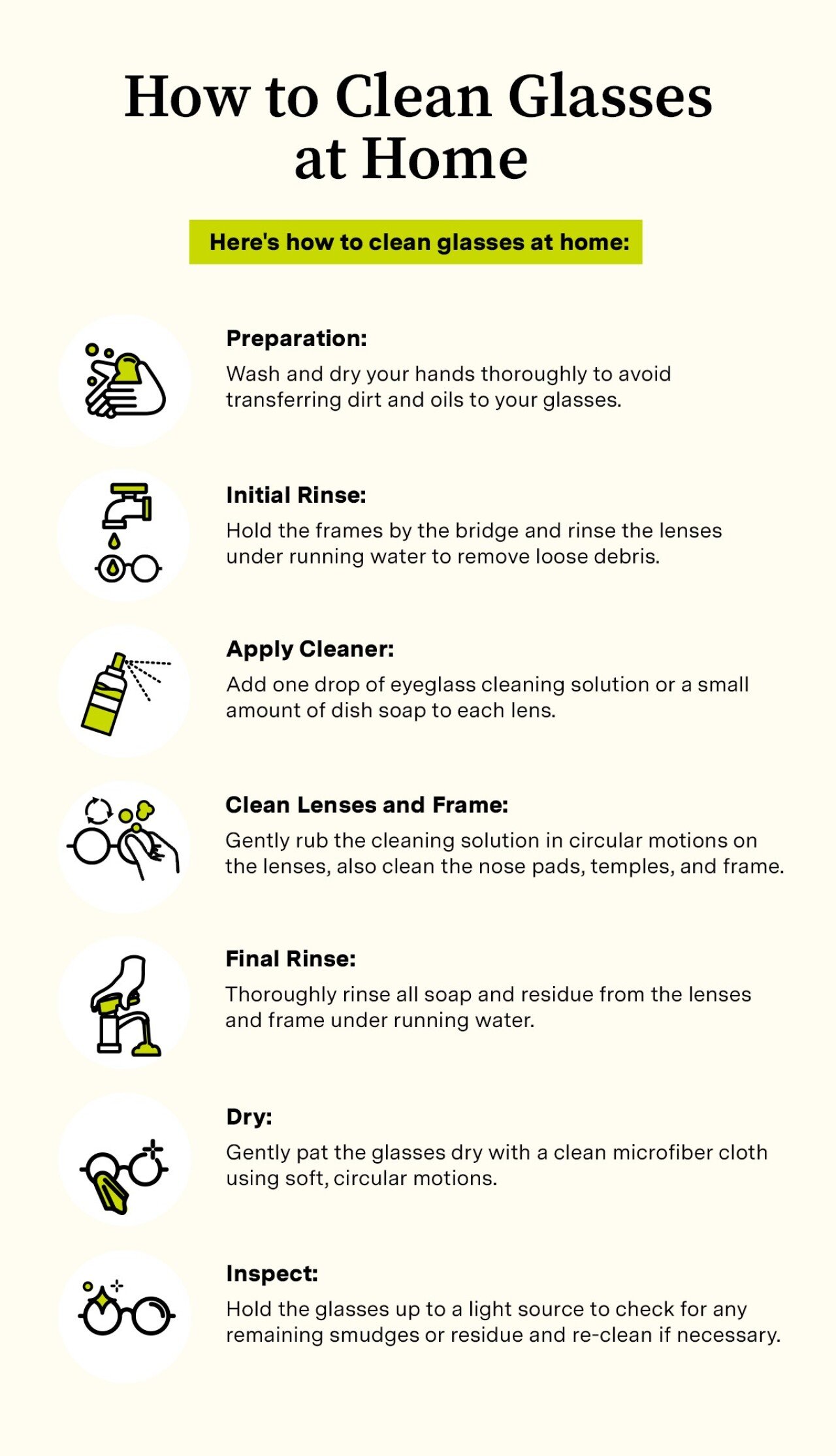What are the best ways to clean and maintain eyeglasses?
Lifestyle

Audio By Carbonatix
12:30 PM on Thursday, October 9
By Tom Determan, O.D. for Eyemart Express, Stacker
What are the best ways to clean and maintain eyeglasses?
Maintaining your eyeglasses should involve daily cleaning with microfiber cloths, proper storage in protective cases, and regular professional checkups to ensure optimal vision and lens longevity.
Your eyeglasses help you see the world clearly, yet many people don't realize how important it is to keep them clean and well-maintained. Whether you've worn glasses for years or recently joined the millions who rely on corrective lenses, understanding how to care for your eyewear is essential.
This expert guide from Eyemart Express outlines proven methods for cleaning and maintaining eyeglasses, ensuring they serve you well while keeping your eyes comfortable and healthy.
Why Is It Important to Clean and Maintain Your Eyeglasses?
Regular cleaning and maintenance of eyeglasses improves your vision, protects eye health and helps lenses last longer. When glasses get dirty with oil and debris, they create visual blocks that force your eyes to work harder, leading to eyestrain and headaches. Clean lenses let light pass through properly, allowing your prescription to work as intended.
Neglecting proper eyeglass care can cause several problems for your vision and eye health. Built-up bacteria on frames and nose pads can irritate your skin and cause eye infections, particularly when the glasses touch your face throughout the day. Using the wrong cleaning methods often creates tiny scratches on lenses that scatter light and make it harder to see clearly over time. Additionally, the buildup of oils and debris can damage lens coatings, ruining their protective properties and requiring costly repairs.
The benefits of taking regular care of your glasses go beyond clear vision:
- Longer lens life: Good care prevents coatings from wearing out early and stops surface damage, helping your glasses last years longer than neglected ones.
- More comfortable vision: Clean lenses reduce glare and scattered light, making your eyes less tired during extended wear.
- Protected coatings: Regular gentle cleaning keeps antireflective, scratch-resistant and other special coatings working properly.
- Better hygiene: Routine cleaning removes bacteria and allergens that collect on frames and lenses.
- Savings: Well-cared-for glasses need fewer repairs and replacements, protecting your investment.

What Are the Best Ways to Clean Eyeglasses?
The best way to clean eyeglasses is to use the right cleaning solutions, along with proper methods and tools made for lenses. Eye care professionals recommend using microfiber cloths with lens-safe cleaning solutions as the main cleaning method, since this combination removes oils and dirt without harming delicate lens coatings.
The best lens cleaning methods include:
- Using lens-safe cleaning solutions and microfiber cloths: These special formulas break down oils and remove dirt without harming lenses or coatings. They don't have alcohol that could strip protective coatings or cloud your lenses. The soft fibers on microfiber cloths trap particles instead of dragging them across your lenses, preventing scratches while cleaning effectively.
- Commercial lens wipes: Pre-moistened wipes offer easy cleaning when you're out and about. Good lens wipes use lint-free materials and dry quickly without leaving streaks.
- Lens cleaning sprays: Instead of a solution, use a lens cleaning spray to get the right amount of cleaning solution, and use a microfiber cloth for a thorough clean.
- Lukewarm water and mild dish soap: When special products aren't available, a tiny drop of gentle dish soap with water works well for heavy dirt or sticky spots. Just rinse thoroughly to avoid soap streaks.
Lens cleaning kits combine everything you need for eyeglass care in one convenient package. These kits usually include microfiber cloths, a bottle of lens-safe cleaning solution, and sometimes extras like lens brushes or tiny screwdrivers for fixing frames. A complete kit ensures you always have the right tools available, wherever you are. Many optical shops offer starter kits when you purchase glasses.
How Should I Clean Glasses at Home?
Cleaning your glasses at home keeps them clear between professional cleanings, helping you see better and making your lenses last longer. The key to good home cleaning is using the proper techniques that protect your lenses while thoroughly removing oils, dust and dirt. Regular cleaning at home stops dirt buildup that can damage coatings and keeps your glasses working their best.
Here's how to clean glasses at home:
- Wash your hands thoroughly to remove oils, lotions and dirt and then dry with a clean towel so you don't transfer grime to your lenses.
- Hold the frames by the bridge and rinse both sides of each lens under gentle running water to remove loose particles that could scratch the lens during cleaning.
- Put one drop of cleaning solution on each lens, using either products made for eyeglasses or a tiny amount of dish soap.
- Using your fingertips, carefully work the solution across all lens surfaces in circles. Then, clean nose pads, temples and frame fronts where oils collect.
- Hold the glasses under lukewarm running water, making sure to rinse all cleaning solution from every surface, including frame corners and nose pad areas.
- Gently pat the lenses dry with a clean microfiber cloth using soft, circular motions to remove remaining water. Work from the center outward to prevent streaks.
- Hold your glasses up to light at different angles to check for missed spots or leftover residue, repeating the process for any areas that need more attention.
What Should I Avoid When Cleaning Eyeglasses?
You should avoid any items that will scratch the lenses or leave streaks, as these can limit the longevity of your glasses. Knowing what to avoid is as important as knowing how to clean them. Steer clear of the following:
- Harsh chemicals and household cleaners: Products with ethanol, ammonia, bleach, vinegar or window cleaners strip protective coatings and can cause permanent lens clouding or color changes.
- Paper towels, tissues or clothing: These materials have rough fibers that create tiny scratches on lens surfaces, slowly reducing their clarity and damaging coatings each time you use them.
- Using saliva: Spit contains bacteria and enzymes that leave residue on lenses and spread germs to your eyes, and it doesn't remove oils properly.
- Skipping rinsing before wiping: Wiping dry lenses drags dust and dirt across surfaces like sandpaper, creating scratches that build up over time and permanently damage your lenses. Be sure to rinse first.
- Extreme temperatures: Hot water can damage lens coatings and bend plastic frames, which may void warranties.
- DIY repairs: Using superglue, tape or makeshift tools for frame repairs often causes irreversible damage and can make professional repairs impossible, meaning you'll need new glasses.
What Is the Best Way to Maintain Eyeglasses?
The best way to maintain your glasses is to establish daily cleaning routines, store them properly and get regular professional adjustments. Following these regular maintenance habits prevents damage from neglect, keeping your glasses comfortable and working well for years instead of months.
Here's how to maintain your eyeglasses so they'll serve you for longer:
- Store glasses in a protective case: Hard cases prevent crushing and scratching when you're not wearing your glasses, especially at night. Keeping your glasses in the same place every time you take them off reduces the chance of accidents or loss.
- Keep glasses away from extreme temperatures: Don't leave your eyeglasses in hot cars, near heaters or in the freezing cold, since extreme temperatures bend frames and permanently damage lens coatings.
- Regularly clean nose pads and hinges: Use a soft toothbrush with mild soap weekly to remove buildup from nose pads and hinges where bacteria and oils collect. This detailed cleaning prevents skin problems and keeps parts moving smoothly.
- Tighten screws and adjust frames as needed: Check frame screws monthly using an eyeglass repair kit, tightening any loose parts before they fall out and cause lenses to shift or fall out.
- Establish a daily and weekly cleaning routine: Do quick daily cleanings to remove fingerprints, smudges and dust, plus thorough weekly cleanings that cover nose pads, temples and frame details.

How Should I Care for Special Lens Types?
You should care for special lens types using gentler cleaning methods and following manufacturer-specific care instructions to preserve their unique protective features. Different lens materials and coatings have specific needs that affect how you should clean them to maintain their special properties without causing damage.
Anti-Glare Glasses
Antireflective or anti-glare coatings reduce glare and reflections by letting more light pass through the lens. These coatings are especially sensitive to improper cleaning methods, since their multiple layers can separate or become cloudy when exposed to harsh chemicals.
To clean antireflective glasses, use cleaning solutions labeled as AR-safe and avoid products with ammonia or strong solvents. These lenses show fingerprints and smudges more easily and need more frequent cleaning with clean microfiber cloths.
UV Protection Glasses
UV coatings block harmful ultraviolet rays from reaching your eyes. Polarized and photochromic lenses feature UV coatings. Polarized lenses in sunglasses need special care to keep their glare-reducing filter layer. Use only manufacturer-recommended cleaners and avoid ultrasonic cleaners that can damage the polarization film.
Photochromic or transition lenses that darken in sunlight keep their color-changing ability best when cleaned with gentle, residue-free solutions. Don't leave these lenses in hot cars, as extreme heat can permanently affect how fast they change.
High-Index Glasses
If you have a high prescription that features multiple coatings, like UV, light and scratch resistance, you probably have high-index glasses. These glasses are thinner and made of a special type of plastic that bends easily and is therefore more fragile.
Use a pH-neutral cleaning solution to clean high-index glasses. Ask your optician for specific recommendations for your lens type. Following proper care instructions maintains warranty coverage and ensures your lenses work well.
When Should I Seek Professional Eyeglass Care?
You should seek professional eyeglass care when home cleaning no longer restores the clarity of your lenses or your glasses don't feel aligned. Professional optical care services make sure you can use your glasses for longer.
Several signs indicate your glasses need professional help beyond regular home care, including:
- Cloudiness or haze that won't go away with thorough cleaning.
- Loose frames that keep slipping even after tightening screws.
- Visible scratches, especially where you look through most.
- One lens sits higher than the other.
- Nose pad discoloration or wear that cleaning can't fix.
You should also schedule annual preventive maintenance to catch problems before they get serious. Regular checkups find loose screws, worn nose pads and coating wear early, when simple fixes prevent expensive repairs.
Professional cleaning removes buildup that home methods miss, especially in frame joints and nose pad parts. In-store visits also ensure proper frame adjustment as frames naturally loosen over time. Properly fitted glasses spread weight evenly, preventing pressure points and ensuring lenses line up correctly with your eyes.
Services Offered by Optical Professionals
Optical professionals provide complete services beyond basic cleaning and adjustment:
- Ultrasonic cleaning: Using high-frequency sound waves in special solutions, professionals remove stubborn buildup from tiny spaces you can't reach by hand. This deep cleaning safely removes built-up dirt without damaging delicate coatings.
- Professional frame adjustments: Opticians use special tools and heating equipment to reshape frames precisely. They can adjust the temple spread, nose pad angle and frame curve for the best fit and comfort. They also do repairs like hinge tightening, screw replacement and minor welding for metal frames.
- Lens inspection: These services detect coating damage, scratches or prescription changes that affect how well you see. Professionals use special equipment to check whether lenses can be fixed or need to be replaced. They also make sure your current prescription still meets your vision needs.
Many optical shops offer free cleaning and adjustment services for glasses bought from them, making regular maintenance easy and affordable. During these visits, you can also ask about new lens technologies or coating options that might help your specific needs.
Frequently Asked Questions
Here is more information on cleaning and maintaining eyeglasses:
How often should I clean my eyeglasses?
You should clean your eyeglasses daily with a quick microfiber cloth wipe and thoroughly clean them with solution at least twice weekly or whenever they look dirty. Daily cleaning prevents oil and dirt buildup that becomes harder to remove over time. If you work in dusty places, exercise regularly or handle glasses often, you may need to clean them more frequently.
Can I use alcohol wipes on lenses?
You should not use alcohol wipes on most eyeglass lenses because they can damage coatings. Alcohol-based products can strip antireflective coatings, cloud lenses and damage frame materials. Some lens makers produce alcohol-based cleaners safe for their specific products, but regular alcohol wipes often have concentrations too strong for glasses.
What should I do if my glasses are scratched?
Consult an optical professional who can assess whether buffing might help minor scratches or if you need lens replacement for deeper damage. Minor scratches sometimes improve with professional buffing services, but deep scratches usually need new lenses for the best vision. Do not use home remedies like toothpaste or baking soda that claim to remove scratches, as they can worsen the damage.
How can I clean glasses with severe buildup?
Soak them in warm water with dish soap for several minutes, then gently scrub with a soft toothbrush, focusing on frames and nose pads where grime collects. For stubborn gunk, optical professionals recommend special enzyme cleaners that break down protein deposits. If this doesn't work, get ultrasonic cleaning done at an optical shop.
Are ultrasonic cleaners safe for all glasses?
Ultrasonic cleaners are safe for most glasses but can damage certain special coatings, loose decorative elements or specific lens treatments, so always check with your eye care provider first. It's best to visit an optical shop for ultrasonic cleaning to avoid damaging your lenses and coatings.
Keep your glasses clean
Proper eyewear care is a small daily effort, but it offers big rewards over time. By following the proven techniques in this guide, you'll protect your eye health and the money you spent on quality eyewear.
This story is intended for informational purposes only and does not constitute medical advice.
This story was produced by Eyemart Express and reviewed and distributed by Stacker.







